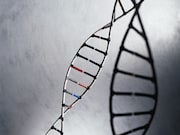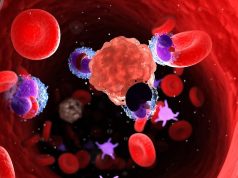Combined with mutation-based cell-free DNA analyses, 91 percent of cancer patients identified
WEDNESDAY, June 5, 2019 (HealthDay News) — Fragmentation profiles of cell-free DNA (cfDNA) can differentiate between patients with cancer and healthy controls, according to a study published online May 29 in Nature.
Stephen Cristiano, from the Johns Hopkins University School of Medicine in Baltimore, and colleagues developed an approach to assess fragmentation patterns of cell-free DNA across the genome and found that healthy individuals had profiles reflecting nucleosomal patterns of white blood cells, while cancer patients had altered fragmentation profiles. The method was used to analyze fragmentation profiles of 245 healthy controls and 236 patients with breast, colorectal, lung, ovarian, pancreatic, gastric, or bile duct cancer.
The researchers found that among the seven cancer types, a machine learning model that incorporated genome-wide fragmentation features had sensitivities of detection ranging from 57 percent to more than 99 percent at a specificity of 98 percent; the overall area under the curve value was 0.94. In 75 percent of cases, fragmentation profiles could be used to identify the tissue of origin in the cancers to a limited number of sites. Ninety-one percent of patients with cancer could be detected by combining this approach with mutation-based cfDNA analyses.
“Overall, we have determined that genome-wide fragmentation profiles of cfDNA are different between patients with cancer and healthy individuals,” the authors write. “Our approach could be further improved through recovery of smaller fragments, evaluation of single-stranded libraries, or use of alternative technologies.”
Several authors disclosed financial ties to the biopharmaceutical industry. Several authors are inventors on patent applications related to cell-free DNA for cancer detection.
Copyright © 2019 HealthDay. All rights reserved.








